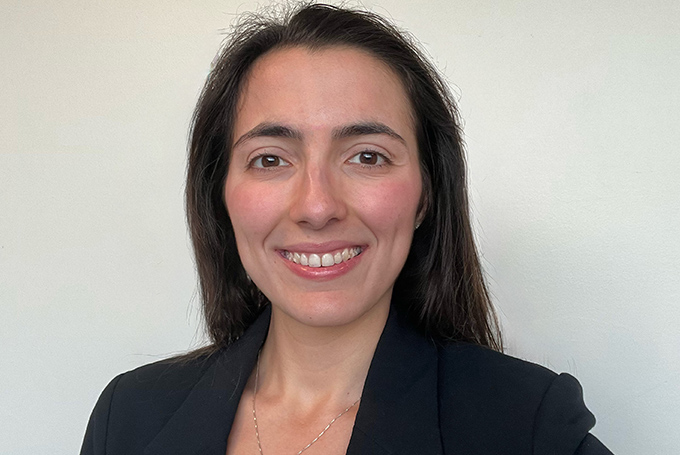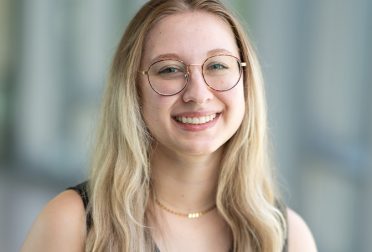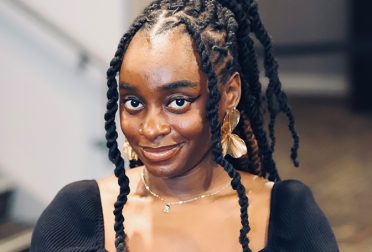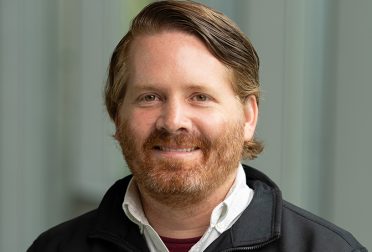Growing up, Kaitlyn Barros was always interested in how things worked and how tools have helped humanity advance their capabilities. At the University of Rhode Island she fell in love with ocean engineering, which aligned this curiosity with her experiences growing up on the water. Now that she’s serving in management roles at the Department of the Navy, she’s ready to further her training to develop new skills while deepening her engineering knowledge. “SDM is a perfect balance between allowing myself to maintain a connection to the technical work that I love, while also growing and figuring out what’s next on my career path,” she says.
What’s the last thing you were doing before coming to SDM?
I currently work for the Department of the Navy. I got my undergraduate degree in ocean engineering, specializing in robotics. When I was a sophomore I started working for a Navy lab that I joined full time after graduation. I’ve been building robotic systems for the Navy ever since. I’m currently a project manager and lead an advanced R&D portfolio specific to maritime robotics development. I was based in Newport, Rhode Island, but about two and a half years ago I relocated to the D.C. area. I plan on staying in my current role while pursuing my master’s degree.
How do you think a systems approach will help you in your work?
I already see the value of a systems approach in my work today. I design robotic systems for one of the harshest environments on the planet. Every element that goes into robotic design, and all of the logistics around deploying, utilizing, and maintaining that system are inherently interconnected. The technical decisions that I make in my work today reverberate through operational layers and financial aspects of that work. I think the systems thinking approach will open that aperture and allow me to better understand how different players move on the field, how to maximize output in R&D, and how to go from a design on paper to a system that can be fielded, sustained, and used effectively.
What’s something you’re hoping to learn in the core class?
The core will give me a stronger foundation in systems thinking. But I’m equally excited for the exposure to my cohort and classmates from other industries and backgrounds. My career thus far has been with the Navy, which I am fortunate for, but it means I have limited exposure to other industries and problem sets. I think the core will broaden my perspective while also bringing together the cohort for the first time—shifting us from individual to unified approaches and thinking styles.
What other courses are you interested in?
I’m split when it comes to the engineering courses, because I love robotics so much that I find myself drawn to robotics based courses. I’m still working through the catalog and have a few different courses that I want to take. I’m most intrigued by the courses being offered through Sloan [School of Management], because it will be my first time that I’m proactively learning in that type of environment. There’s Accounting Information for Decision Makers, there’s Power and Negotiation, and a course on how to invent and deploy transformative technologies that I’m eyeing.
What’s something you’re looking forward to about meeting all of your new classmates?
When I was in my undergraduate program, my class started as many very different individuals, but by the end we were like family. It’s where I met some of my best friends. I’ve seen the same thing happen with my coworkers. So with this cohort, I’m looking forward to both sharing my experiences, lessons, and approach to problem-solving, and learning from theirs. I’m also genuinely excited to see how the friendships develop along the way.
What are you most looking forward to with being part of MIT in general?
I’m excited about joining the SDM cohort, but that feeling also extends into the wider MIT community. I’ve heard such great things about the opportunities to get involved on campus, the meaningful relationships students build with professors, and the ways people engage and get involved in research. The cohort feels like a microcosm of that larger community, and I’m looking forward to exploring and contributing to both.




